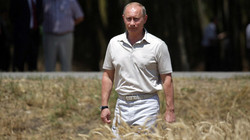Billionaire farmers reap fortunes from Russia food sanctions
by Anatoly Medetsky
Russia’s geopolitical conflicts, anemic oil prices and weakened ruble are working out rather well for the country’s biggest publicly traded farming company.
Ros Agro Plc has ambitious plans to build pig farms and greenhouses in central and eastern Russia, as well as for acquisitions, by selling U.K.-listed shares.
Its aim for the first Russian offering of new stock in London since October illustrates a wider renaissance for the nation’s farms as billionaires from Vladimir Evtushenkov to Gennady Timchenko, friend of President Vladimir Putin, invest in tomatoes and apple trees. It also marks the curious consequences of Russia’s worst falling out with the U.S. since the Cold War.
Ros Agro, owned by Vadim Moshkovich, another billionaire, will raise $250 million to fund investments and help fill a void left by falling food imports after tit-for-tat trade sanctions between Russia and western nations, and a weak ruble that raises prices of shipments from overseas.
“The company is going to invest aggressively and grow,” said Svyatoslav Arsenov, who helps oversee about $300 million including a Ros Agro stake at UralSib Asset Management in Moscow. “The devaluation of the ruble has made the sector very attractive from the perspective of money generation.”
Russia, the world’s ninth-biggest food importer in 2013, had cut its overseas purchases almost 40 percent to $26.5 billion by 2015, according to government data. Putin has urged a drive to increase food security, saying last year that Russia’s huge tracts of farmland “make us the richest country” in agriculture.
While Russia is self-sufficient for some meat, it doesn’t produce enough dairy, fruits or vegetables, Prime Minister Dmitry Medvedev said in February, promising state support. Its imports of vegetables were valued at $1.7 billion last year, and some tomatoes came from as far as Senegal in West Africa, government data show. Agricultural output rose 3 percent last year even as the economy shrank 3.7 percent.
Ros Agro and its shareholders have been beneficiaries.
The company’s global depositary receipts have more than doubled since Russia banned some food imports in August 2014, reaching $16.15 apiece by Friday in London. Moshkovich, owner of three-quarters of the current stock, plans to invest $100 million in the issue of new securities. The GDRs declined for a fourth straight day Monday.
We “favor Ros Agro as a way to invest in the import-substitution theme,” Bank of America Merrill Lynch analysts including economist Vladimir Osakovskiy said in a note Friday.
Ros Agro’s offering would be the first in London by a Russian company since Lenta Ltd., a retailer backed by U.S. buyout firm TPG Capital, raised money in October. Other businesses such as Eurasia Drilling Co., Russia’s largest oil driller, and potash producer Uralkali PJSC, have been withdrawing their listings as investors’ taste for energy and emerging markets soured.
Ros Agro will probably sell global depositary receipts representing the new shares at about $16 to $17, according to Vladimir Vedeneev, chief investment officer of Raiffeisen Asset Management in Moscow. While some potential investors worry the price has surged too far, others anticipate enough demand.
“There will be investor interest," said Joseph Dayan, head of markets at BCS Financial Group in London. “Ros Agro still trades at undemanding levels.”













